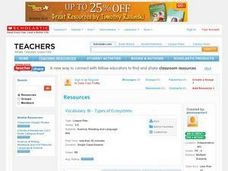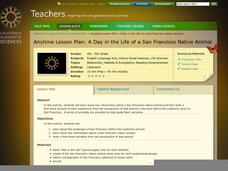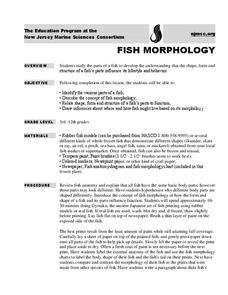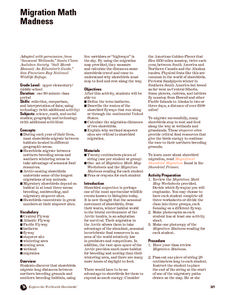Curated OER
Life Cycle of a Monarch Butterfly
Students identify the stage of the butterfly's life cycle. In this life cycles lesson, students create a KWL chart about monarch butterflies. Students observe monarch caterpillars in an aquarium and identify the various stages of growth.
Baylor College
Fuel for Living Things
During a three-part instructional activity, learners make a cabbage juice pH indicator and use it to analyze the waste products of yeast after feeding them with sugar. The intent is to demonstrate how living organisms produce carbon...
Institute of Electrical and Electronics Engineers
Life Vest Challenge
After reading about the history and science of personal floatation devices, patents, and intellectual property, engineering teams design a life vest for a can of soup. To evaluate which groups considered the need for waterproofing, hold...
Curated OER
Vocabulary: Types of Ecosystems
Pupils practice using vocabulary words from life science. They will investigate the ecosystem and the terms that are associated with it. In addition, they will complete a fill-in-the-blank exam using the vocabulary words.
Science Geek
Build a Food Web Activity
Entangle your life science class in learning with this collaborative food web activity. Using pictures of the plants and animals native to a particular ecosystem, young biologists work in small groups to construct visual representations...
University of Waikato
Build a Marine Food Web
Dive into a lesson on marine ecosystem interactions. Individuals learn about and devise a marine food web. The resource provides organism cards and pupils use article resources to discover interactions before modeling them in a food web.
Curated OER
I Wonder How the Manduca Life Cycle Compares To the Human Life Cycle...
Students study life cycles including developing their understanding of the human life cycle. They decide where they are in the human life cycle and provide reasons for that placement. They compare the human life cycle to that of the...
Curated OER
Life Science Observations: Living vs. Non Living Things
Students investigate the difference between living and non-living things. In this life science lesson plan, students discover the different characteristics of living things and the natural or human created non-living things. Students...
Curated OER
Life Science Review for Grade 4
In this life science review for grade 4 worksheet, 4th graders answer 25 multiple choice questions in standardized test format about life science.
PBS
Blow the Roof Off!
Blow the minds of young scientists with this collection of inquiry-based investigations. Based on a series of eight videos, these "hands-on, minds-on" science lessons engage young learners in exploring a wide range of topics from making...
American Farm Bureau Foundation for Agriculture
My Miniature Greenhouse!
Here is an activity that will peak your super scientists' interest and knowledge of greenhouse gardening. Green thumbs flourish when they build, prepare, take care of, and observe their seedlings inside a miniature greenhouse. With...
Curated OER
Marine Debris
Now is the time to educate tomorrow's citizens to care for the planet, and here is a lesson to help facilitate the process. Collect some marine debris and bring it into class. Have your class separate it into types and then test each...
Scholastic
Study Jams! The Senses: Tasting
Mmmmmmm, here is a tasty little slide show to use when introducing upper-elementary learners to the sense of taste. Photographs and detailed computer images accompany explanatory text about how the taste buds and the nose send signals to...
California Academy of Science
A Day inthe Life of a San Francisco Native Animal
Although the lesson is specifically about the San Francisco Bay area, it's good enough to be adapted to any local region. Children research what the landscape in San Francisco was like prior to settlement, they consider the types of...
Consortium for Ocean Science Exploration and Engagement (COSEE)
Fish Morphology
Life comes in all different shapes and sizes, and fish are no exception. Here, young scientists create fish prints as they learn how specific characteristics allow different species to survive in their particular habitats.
Umaine Museum of Art
Bony Fish Anatomy Worksheet
Take time to appreciate the beauty in the anatomy of animals with this cross-curricular art and science activity. After viewing examples of fish-themed artwork, children complete the included worksheet by labeling the different parts of...
Curated OER
Ocean Animals Word Scramble
For this worksheet on ocean animals students will examine eight pictures and scrambled names of different ocean animals, then write the unscrambled name on a blank line.
Curated OER
Examining Pond Life
Students collect and examine microscopic life from a local pond. In this biology activity, students examine local pond water, searching for protozoa, with the use of a microscope. Students identify the various life forms in their slides...
Curated OER
Endangered Marine Turtles
Students work in groups and experience what it is like to be a hatchling marine turtle by playing a board game. In this endangered marine turtles lesson, students research the threats to marine turtle hatchlings. Students then create a...
Curated OER
Classifying Deep-Sea Organisms
Young scientists access the EARTH Web site in order to engage in this lesson life forms found in the ocean. Student groups of 3 - 4 choose one set of deep-sea organism images. The groups decide how they would classify their organisms and...
Baylor College
Lungometer
Life science learners construct lung-o-meters from gallon-sized milk jugs and then measure their lung capacities. For older students, have them graph the vital lung capacities of each person in the class. Cross-curricular pieces are...
National Wildlife Federation
Massive Migrations
Turn your students into flocks of migratory birds for this fun activity on animal migration. Prior to the activity, the teacher creates four different migration routes in the classroom or any available open space, labeling nesting...
Berkshire Museum
Meet a Naturalist: Researching, Writing, Interviewing
Young scholars reach out into the community and learn about different environmental science careers in this inquiry-based instructional activity. Beginning with a short research assignment, children gain background knowledge about...
Prince William Network
Migration Math Madness
A great way to incorporate math into life science, this lesson has learners measure migratory routes on a map and calculate the actual distance that shorebirds on the routes would cover. Learners compute the distance covered in both...

























